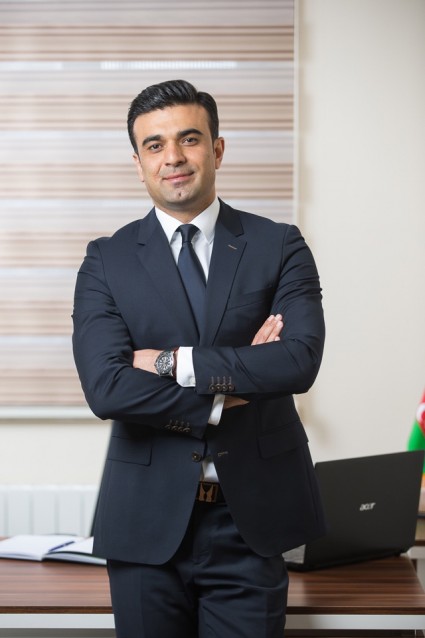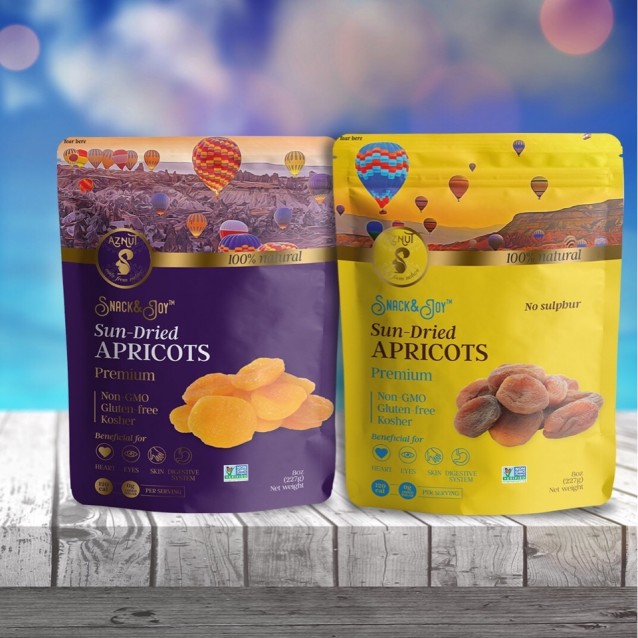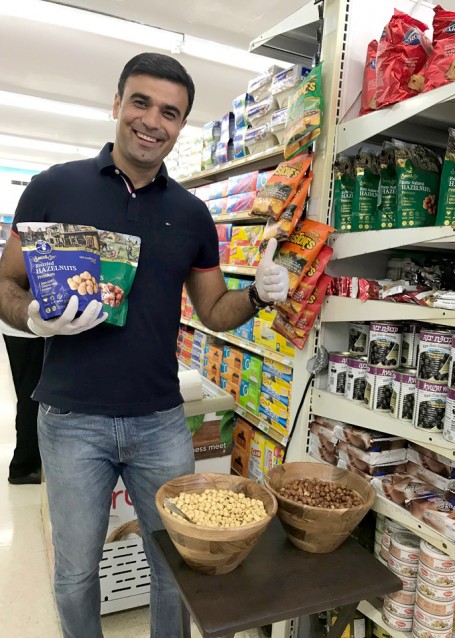During the last days of 2018 I saw an intriguing post on LinkedIn that read Azerbaijani hazelnuts become a best-selling product on Amazon. Naturally that sparked my interest and I decided to check whether the link was authentic. The company behind the product was called AZNUT and through a curious chain of coincidences its founder, Samir Kazimov, turned out to be an acquaintance of the Visions photo editor and was visiting Baku in late January. Despite having only a few days in the city, Samir kindly agreed to share with us the story behind his hazelnut business, which has quickly become a bestseller on Amazon.
From Sumqayit to South Florida
While growing up Samir often saw his father, who at the time was a successful businessman, in action, and was inspired to follow in his footsteps. Seeing the pride emanating from his father when he showed Samir the form stating that his Azerbaijani products (fizzy drinks) had been shipped abroad convinced him that this is what he would strive for in the future too.
However, after graduating from university in Sumqayit, for approximately 10 years he pursued a different career in insurance and in just four years, he managed to boost the sales of insurance from seven to 75 million manats in a country where the concept of life insurance was still relatively new.
This achievement won him the 2016 Rising Star of Innovation award, presented by the American company Limra to 25 extraordinary achievers under the age of 40, and this would play a defining role in forming a very different future for him. The award came at a time of major decision-making as he was already 35 and still had a lot he wanted to do. America was one of the few countries he hadn’t yet explored, the idea to start a business had been developing and this award was a sign that it was time to take the first step.
That’s where I think the problem with a lot of young people is now, they want to travel, start something of their own, but when they already have a good job, a car, a nice apartment, an annual bonus, this safety is too hard to leave. But let me tell you, once you leave that comfort zone, that’s when the magic happens.
He chose Miami, Florida, thinking purely in terms of business since it’s a touristy area, with a good inflow of people from all over the world. My friends often told me that this is exactly the place for me. So I decided to try, asked for six months off: if it works – great, if it doesn’t – I’ll come back and continue from where I left off.
The friendly people, a similar warm climate, the countless opportunities, and that irresistible feeling of the freedom of starting his own business led Samir to take the bravest step having been there for only two days: he called home to say he was staying in Miami. After that decisive phone call, it took his employer just three days to hire a replacement, which was actually a great motivator because the only way he could go now was forward.
In search of the American Dream
He then started looking into ways of obtaining proper documentation for starting a business and found out about a visa granted to foreigners of extraordinary ability. He fit all the criteria, but the lawyer with whom he was consulting didn’t have much faith in him given the countless failed attempts he had witnessed even from the most extraordinary applicants. After all, Samir was just an insurance agent, not a businessman.
In these two years in the US I understood that people will try to demotivate you, for the lack of courage in themselves or for whatever reason but how can I know it’s not going to work out, if I don’t even try? Every time I heard disbelief or denial from someone – it only motivated me more because I believe that in life, two things always happen – what you fear the most and what you want the most.
And despite the lawyer’s disbelief, he sent in his application.
For two months, he lived in the United States exploring the new culture, the people, their habits, their attitude to life and others around them. His insatiable curiosity brought him into contact with people who had achieved the American Dream and were willingly sharing the recipe for their long-term success. It was simple and already in Samir’s possession: use your brain and have an honest heart, because people feel your intentions.
In between his cultural explorations, he was trying different foods, surprisingly discovering that produce in this part of the world tasted quite different; even the organic options. Once in a restaurant, staying true to the Azerbaijani tradition of tea drinking, he asked for some hazelnuts and when he tried what was served to him he couldn’t believe the stark difference between them and Azerbaijani nuts. An idea had formed!
About two months into his explorations, he learnt that he had passed the first round of the visa application process and now needed to come for a personal interview. The officers weren’t quite convinced that this former insurance agent could build a business, but Samir made a deal with them. He asked for six months, presenting them with a business plan to bring high quality, organic, non-GMO hazelnuts from Azerbaijan. Given that the organic food culture was on the rise, it was a good idea, but only in theory and the officers wanted to see if it was actually going to work. His application was approved for the six-month trial period for him to prove the success of his venture.
With love from Zaqatala
He started talking to Azerbaijani nut exporters, asking for a preliminary order of four tonnes of hazelnuts, which wasn’t economically viable for the companies, which required a minimum order of 20 tonnes per container. Although four tonnes wasn’t profitable for them, they would have been enough to establish AZNUT hazelnuts as the first ever Azerbaijani product in the American food sector. Fortunately, one farmer in Zaqatala, who wasn’t worried about his profits and just wanted to support his compatriot, agreed to send Samir the required amount.
When the pallet arrived, he sat in front of it submerged in an ocean of doubtful thoughts. In the silence appeared many questions: What next? Did I make the right choice? He opened the box and tasted the roasted nuts and if you’ve ever tried roasted hazelnuts from Zaqatala, you will know it’s almost impossible to stop. Those won't sell themselves while I sit here and ponder, he thought. After that one moment of weakness, he got started with the real work.
Marketing companies advising Samir vehemently opposed putting Baku on the packaging, because it was unknown in America, and argued in favour of using an image of California instead. But Samir believed that there was no better way of letting people know about his country than showing it off through its tasty food products.
Until Samir’s AZNUT entered the market, Turkish producers hadn’t had any competition for over 30 years. Given that Samir started with just four tonnes, his product was three times pricier than what was sold in local shops and shopkeepers didn’t let him place his product, thinking it wouldn’t sell because of the price. But this only motivated Samir.
He gave two boxes to the shopkeeper and said, just place it here, if it sells – good, if it doesn’t – it’s yours. The shopkeeper tried to argue that he had no space in the store, but Samir found an unusual corner for it – next to the potatoes. The shopkeeper could do nothing but agree.
When you’re working and you see the positive results here in the United States, it feels like flying! I’m working for 20-21 hours a day, sleeping for only three hours and I feel absolutely great! It’s because I don’t have any other choice but to make it work, I find ways I didn’t even know I could find. You get tired, hell, you get exhausted, but you’re the happiest person ever.
| Hazelnuts in Azerbaijan: Azerbaijan is one of the top five hazelnut producers in the world and exports mainly to Europe and the CIS, although the Middle East is an emerging market. Most of the nuts come from the country’s northwest – the regions of Qakh, Zaqatala and Balakan – where cultivating hazelnuts is the major industry. The nuts are harvested in August and September with each tree producing up to eight kilograms, meaning families with orchards of some 100 trees can reportedly earn between 4,000 and 5,000 manats per year. Domestically, hazelnuts are a key ingredient in popular sweets such as shekerbura, pakhlava and halva and their shells are used to fuel stoves in winter. A hazelnut festival takes place in Zaqatala each November. |
The next day, standing in front of a store, Samir showed the picture of the package, gave each customer $5 and asked people to buy it. Two hours later, the shopkeeper called him, asking for more nuts to be brought to the store, but this time placed them front and centre – these things were selling! The important thing was to show that this product deserved a chance – the rest would happen by itself.
Three days later the same shopkeeper requested even more nuts for three of his other shops, because the interesting package showing an unfamiliar place was catching the eye of shoppers, who proved to be willing to pay more for higher quality hazelnuts. Samir’s marketing strategy had paid off!
Six months later, when it was time to meet the migration committee, he took out a pack of nuts and the unexpected happened – one of the officers bought them as a snack for her kids. Needless to say, his application was approved, and according to Samir he became the first ever Azerbaijani food importer in the American food sector.
Reaching a global market
They say that if your product makes it into the 200 bestsellers category on Amazon, you can consider your business a success. When AZNUT started selling on Amazon last February it ranked about 895th among hazelnut products. But Samir perfected his product, personally handpicking the best nuts for each pack, making sure the resealable package worked properly and reading hundreds of customer comments published under his competitor’s products.
In September AZNUT’s hazelnuts reached 87th according to Amazon ratings behind four Turkish and two American companies, which had been in this business for over 20 years. But when AZNUT started to creep towards the best 50 companies, the competitors, whose arsenal included a great variety of products, began dropping their prices significantly.
But instead of doing the same Samir took a big risk: he decided to increase his prices instead, believing that customers weren’t after the cheaper price, but the better quality product. In Samir’s words, those were the slowest days of his life – the company hardly sold anything. But by the fifth day, customers had tasted the difference in quality and came rushing back to AZNUT, willing to pay the 50 extra cents.
Samir also hoped to place AZNUT products (which also include dried fruit) in one of America's largest natural food store chains, but this company received up to 500 new products daily and so simply presenting his product by phone or email wasn’t an option. In Samir’s usual persistent manner every Friday he brought a box of nuts to their headquarters. On one of those Fridays, three months later, he was patiently checking his box when a man who had noticed the packaging approached him. Samir explained that he brought his product every Friday, believing that one day luck would be on his side. And indeed it was because the man in front of him turned out to be the head supervisor of the store.
“Come, let me show you something,” he said. We entered a spacious office inside, where on each desk was the package I knew so well. “Whoever was complaining about gaining weight because of these nuts – here, you can blame him,” Samir recalls the supervisor saying to his colleagues.
In such a way, after a short presentation AZNUT’s raw and roasted hazelnuts were welcomed to this store. But Samir’s bigger achievement is that Americans are now enjoying Azerbaijani products, knowing where they come from. He is now living his American Dream and his company is likely to only grow bigger from now on, introducing more Azerbaijani delicacies to the Western world. And hopefully one day the country of origin – Azerbaijan – will not cause confusion, but stand for high quality and a good heart.





.jpg)